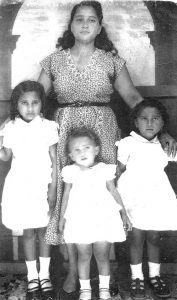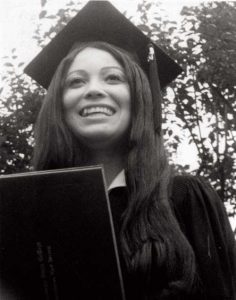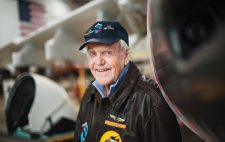It’s 1962. Sitting between her parents in the front seat of a battered blue 1950s station wagon, 8-year-old Gloria Bonilla carefully studies a map under the glow of a flashlight. Though the youngest among her four siblings, Bonilla’s strong skills in English make her the family navigator as they travel between South Jersey and Florida, where her family labors as migrant workers.
More than five decades later, Dr. Gloria Bonilla-Santiago’s charter school, LEAP Academy (Leadership, Education and Partnership) is sending kids from Camden to top-notch colleges including Princeton, Emory, Carnegie Mellon, Cornell and Rutgers. Santiago, 60, chronicles her lifelong journey in her book “The Miracle on Cooper Street,” telling a tale of persistence, love, tragedy, hard work and, ultimately, great success. It’s quite a ride.

Young Gloria with her sisters and mother Nuncia Bonilla
“We left Puerto Rico when I was 4, and I grew up between South Jersey and Florida,” she recalls. “My family worked with two farmers in Woodstown and Pedricktown for six months in New Jersey and then went to Florida to work on farms there for six months. I had come from a very wonderful life in Puerto Rico to South Jersey, which was not a bad place, but it was very scary. We came in winter to a camp in the middle of Elmer Road that was very isolated. I came without a coat – my mom had no idea what the winter was like.”
Santiago went to school and helped her family work in the fields during the summer and school vacations. “I learned English quickly and became the translator for my parents,” she says. “It gave me a sense of responsibility. I had to grow up very fast. Life was about survival. We were very poor – I didn’t have my first Christmas tree until I was in graduate school and got engaged. I knew that going to school was the only way out for me.”
Her father was especially supportive, encouraging his daughter to excel in school and teaching her about the politics of the farm. As a union leader, he sparked her interest in social action. “He was the man that everybody went to for help. He was very well-respected,” she says.
Her relationship with her mother was much tougher. Santiago’s mother wanted her daughter to lead a traditional life that meant getting married and leaving her education behind, but the young girl rebelled. As a teenager, she met social activist Marta Benavides, who allowed Santiago to live with her and stay in school in New Jersey instead of going back to Florida for the work season. Benavides became Santiago’s mentor and furthered her interest in social action.

Gloria Bonilla rebuked Latina tradition and left her family to attend college
“I lived with Marta for 10 years and went to college,” says Santiago. “In a traditional Puerto Rican family, you don’t ever challenge your mother. You don’t go away. Had I not done that, who knows what my life would be like. That kind of vision and determination prepared me to do everything I ever wanted to do and probably more.”
Santiago took the discipline, focus and strong work ethic she learned as a child and against all odds, created Camden’s first charter school, LEAP Academy University Charter School. From 1993 until the school opened in 1997, she established political connections and used every possible resource at Rutgers University, where she served as director for the Center for Strategic Urban Community Leadership, to make her dream a reality.
“I was always interested in social justice, and I wanted to make a difference,” she says. “The achievement gap between the poor and the rich is so big. When you look at cities like Camden you see black and Hispanic kids; you never see white kids. In 2014 you have more segregation today than you had in the ’60s. People don’t talk about it. It’s like it’s OK to have that segregation.
“I love children, and I saw how kids in Camden were lost and the public schools weren’t working. Too many kids were falling through the cracks. I began to develop this vision of Cooper Street with Rutgers University being an anchor.”
Today, LEAP Academy teaches 1,500 students from infancy through high school and boasts a 100-percent graduation rate. Santiago is quick to note that every graduate goes on to college. In addition to a traditional upper school curriculum for seventh through 12th grades, the school also offers a STEM (science, technology, engineering and math) program.
Santiago attributes her school’s success to small class sizes and a longer school day, enabling students, especially those who are struggling, to get more personal attention. Yet she does admit that occasionally a student may be unwilling to put in the hard work necessary to stay on the path to graduation.
“There’s a lot of support, but there are kids who have not passed a grade and have to go to summer school to catch up,” says Santiago. “We don’t give up on children. But there might be a child or two who transfers out if it’s not working. We tell them if they want to go somewhere else – a technical school or another Camden school – we will let them go if we know that’s what the parent wants.”
Parents’ input is paramount at LEAP, Santiago says. She believes that to educate students, you must also educate families. “I make a contract with the families that they have to give 45 volunteer hours of time and be an active part in their child’s education,” she says. “We also have a wellness program to be sure parents are learning how to eat right at home.”
While Santiago considers LEAP’s students her children, tragedy struck before she started a family of her own. In December 1996, her husband of 13 years, Alfredo, was killed by a drunk driver.
“That was the breaking point for me,” she says. “I was building the school for other people to run, because I was taking a university presidency job. But when he died, everything changed. I was so destroyed by his death. He was my soul mate and my support. I felt in my heart I needed to build the school and do it in a way that was meaningful. I changed my goal and realized there was nothing more important to me than the kids.”
She stayed at LEAP and devoted her life to its students. In her husband’s memory, she created the Alfredo Santiago Endowed Scholarship to provide funding for LEAP students to attend Rutgers University. Students can begin earning the scholarships as early as first grade.
“There’s nothing more powerful than to tell parents who have no money that you’re going to do everything possible so their child goes to college,” she says. “That will be their first generation to go to college, and that helps break that cycle of poverty.”
Santiago says the process of chronicling her journey in her book was difficult. “I had to go back to places and times like the death of my husband, reliving what it meant to be in the camps and thinking how fragile we were,” she says.
With two decades of success in her arsenal, the educator’s current goal is to help others create schools according to her plan. “I know what it takes to develop an institution that has the right ingredients – accountability of money, people and resources; support for teachers; a pipeline that starts from babies and goes all the way to college; support of parents and holding them accountable; and extending the length of the school day and year,” she says. “I’ve been able to save all these children in a city where no one thought it could be done.”










